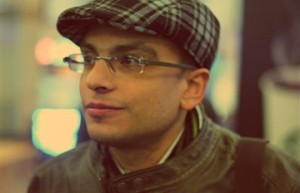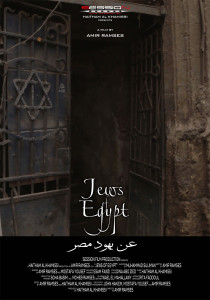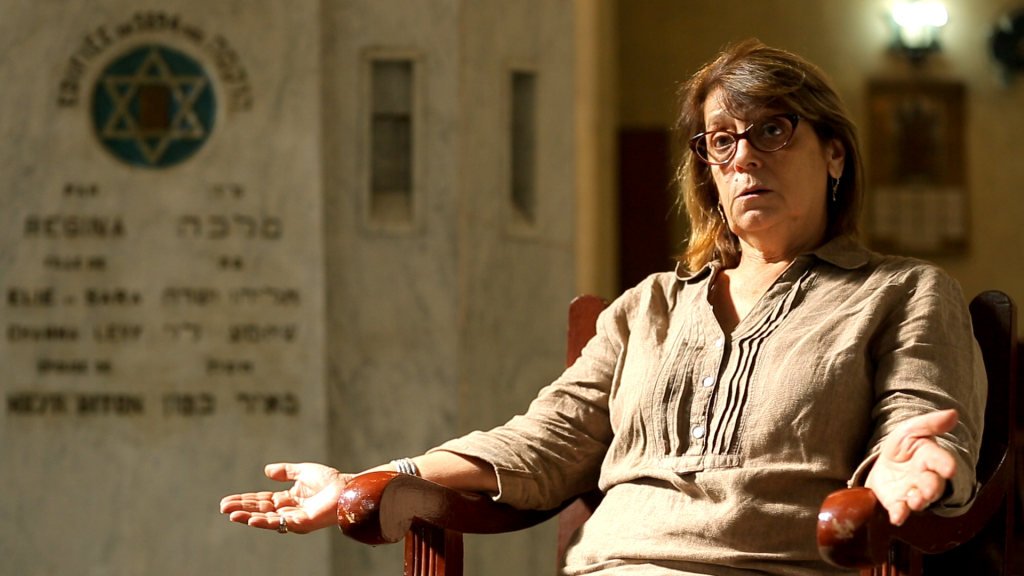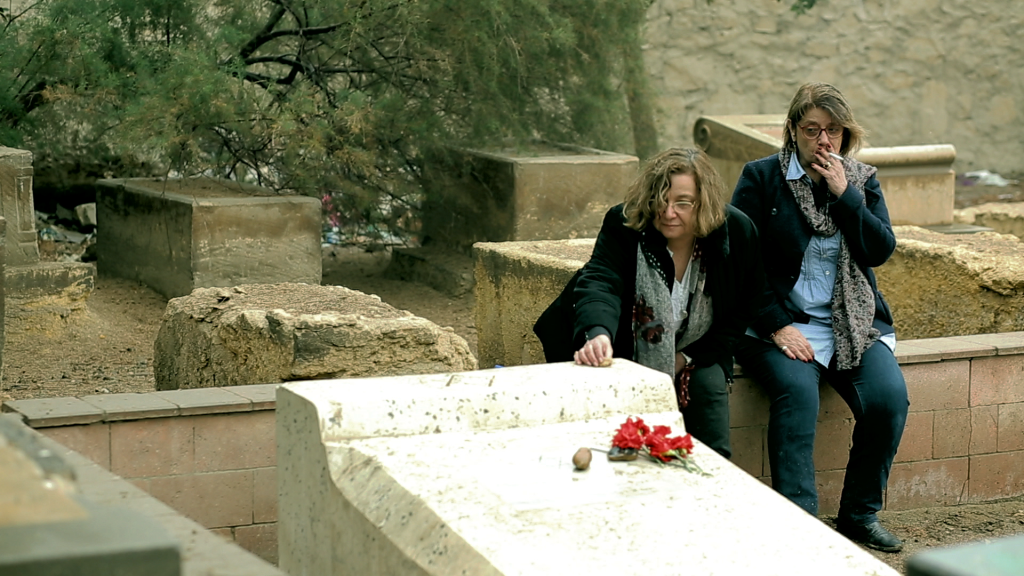Q&A: Amir Ramses, Director of ‘Jews of Egypt’

Sitting excitedly in a dark movie theater, a ten year old boy stares happily, eyes transfixed at the screen in front of him. Watching the iconic filmmaker’s – the late Youssef Chahine – Iskindriyah Kaman we Kaman (Alexandria Forever and Ever) come to life transformed the little boy into an avid movie lover. And by the end of the movie, young Amir Ramses knew that this is what he wanted to do for the rest of his life. He wanted to become a director.
Ten years later, Ramses had graduated top of his class at the Film Institute and was given the unique opportunity to work with none other than the man who made him want to venture into this industry, the great Chahine himself. Becoming one of Chahine’s young proteges was one of the key milestones and the spark that ignited the rest of his cinematic career.
Ramses’s film reel includes Kashef Hessab, 2007 (Unpaid Bill), Waraet Shafra, 2008 (The Code), Omar Khayam, 2010 (doumentary) and Jews of Egypt, 2012, 2014. His work has participated in several festivals around the world including Valencia Film Festival, 2000, Incur Film Festival, 2001, Taghit Film Festival, 2007 and Cinemobile Film Festival, 2012.
After a long and vicious battle with state security, censorship office and a rigid and conservative society, Ramses’s documentation of the history of Egypt’s Jews finally saw the light. The unexpected success of the documentary garnered its filmmaker raving reviews by all, which paved the way for a sequel that was recently premiered at the 2014 edition of the Ismailiya Film Festival.
How did the idea of Jews of Egypt evolve?

I was always intrigued by the pre-1952 period of Egyptian history – cosmopolitan Alexandria, tolerance, the kind of life where it didn’t matter what your religion was. Living in Egypt today and with the rising of sectarian violence, I think was the trigger that pushed me to make this film […] I wanted to defend an Egypt I didn’t see in person but always wished to live in.
What was it like working on such a project? The ups and downs?
I think that when you work on such a topic you just keep living a series of “downs” and wait for the film to be seen years after to start speaking of “ups”.
I think that the fights with national security and trying to get the shooting permits and getting to shoot with all the paranoia created about the word “ Jewish” – even amongst intellectuals – was the biggest challenge. Of course, also tracking the people who appeared in the first part of the film in France was somehow a big challenge.
I have to say also that we really did the first part of the film guerilla style because we financed it on our own […] Anyway four years, we managed to finish it and received great feedback, which gave a big ego boost and encouraged us to work on the sequel.
Was it difficult finding people to appear in your documentary?
I have to say that it was very difficult, especially in Egypt. Egyptian Jews living here were at first too afraid to talk, while historians and writers thought that the project was too ambitious to be true. I even heard this phrase so many times: “This film will never see the light, but you seem like a nice person and I will give you the interview just for that .”
Some others I had to follow for a year or more, showing them bits and pieces of the editing to prove to them how important their stories were to the project and to the case – for example, Albert Arie, one of the last remaining Jews in Egypt and whose story seemed irreplaceable for part one.
Some others tried to force me not to speak of certain topics so that they would appear in the film, yet I refused to do so. I have to say that with all the logistic problems of shooting in France, once I made it there, it was much easier to shoot my interviews. It seemed like the Egyptian Jews there felt like they needed to pay this tribute to their past.
Of course I have to say that all this changed with the warm reception of part one and that really convinced many of the people who hesitated and refused to be in it to appear in the sequel.

What is the one thing that people probably don’t know about your film that you would like them to know?
I think that whenever I meet someone who talks about the film, they talk in pity about how shameful it is that the film didn’t get much success in theaters. However, we made it four weeks in theaters and we were the second Egyptian documentary to get a theatrical release in the history of Egyptian cinema.
If I dare say so and not be called arrogant, the film managed to change something in the way Jews are perceived by thousands of Egyptians.
What does it mean to finally have Jews of Egypt screened at an Egyptian festival?
I think it proves to me that I won my battle. Being appreciated by an official Egyptian festival means I managed to break the taboo. I guess that in the screening hall of the opening, some of the people who tried to ban the first part were present.
I like to feel that one way or the other, I proved myself right and showed them how positively Egyptians received the film.

If you could make any movie, what would it be about?
I have always dreamed of turning Waguih Ghaly‘s masterpiece Beer in the Snooker Club into a movie. It is a novel about the how the Egyptian society started to fall during the totalitarian era of the 50s and the self destruction of the middle class intellectuals that followed.
Any future plans?
I am working on a black comedy feature and I’m planning to start shooting by next September. It will be a one-day film set in modern Egypt on how can extremism and fanaticism disrupt the love of living and life itself.
Are you optimistic about the future of film making in Egypt?
I am very optimistic. I think Egyptian filmmakers are really getting over all the obstacles, like financing their ambitious projects, despite the mainstream and censorship obstacles thanks to technology, new digital shooting and screening facilities, which made things possible – as opposed to ten years ago, when we used to think a million times before dreaming of a non-commercial film or a film that breaks taboos.
Tell us a little about your never-ending struggle with the censorship office?
At the beginning, it didn’t seem to be a real struggle, actually. My script got refused. I had two meetings with the censors and convinced them with my point of view and they gave me the shooting permit (later on, I discovered the first refusal came from security agencies) and one way or the other, I think when I insisted to do the film they said to themselves, “Let’s just give him the permit and not create a media fuss out of it. After all, it’s a documentary and no one watches documentaries in Egypt.” I think also the fact that back then, I was appearing a lot in media after the release of one of my feature films led them to think it was safer not to ban the film…
All that changed after we got a local distribution and a theatrical release. That was when they tried to ban the screening of the film after we had already gotten the approval by the censorship office on the final copy of the film and sent it to many festivals and even screened it in small venues and cultural events locally. They feared a larger exposure to the public in Egypt
Of course, legally they had no right to do so after we already had the permit and we went into a fight for a few weeks. It got into media and out of fear of the scandal getting bigger, they finally gave us the permit and asked us not to speak again of their attempts to ban it and to pretend it was a paperwork problem… and the film made it to the theaters a few weeks later than the scheduled date…
Then again, the bureau of the Ministry of Culture (which is responsible for the censorship) tried to force us to write a note at the beginning of the film that it was fictional and the characters where created by the director, which was ridiculous and stupid since it is a documentary.
I said I would only do it if that note is issued and signed by the bureau. “If you want to make fools out of yourselves do so, but I won’t,” were the exact words I said. They issued that note and signed it and we put it in the beginning of the film followed by another one saying that the previous point of view was that of the Ministry of Culture and not that of the film crew as stated in the note itself.
WE SAID THIS: Check out our Q&A with Amr Salama, Director of ‘Excuse My French’, about his battle with the censorship office.
